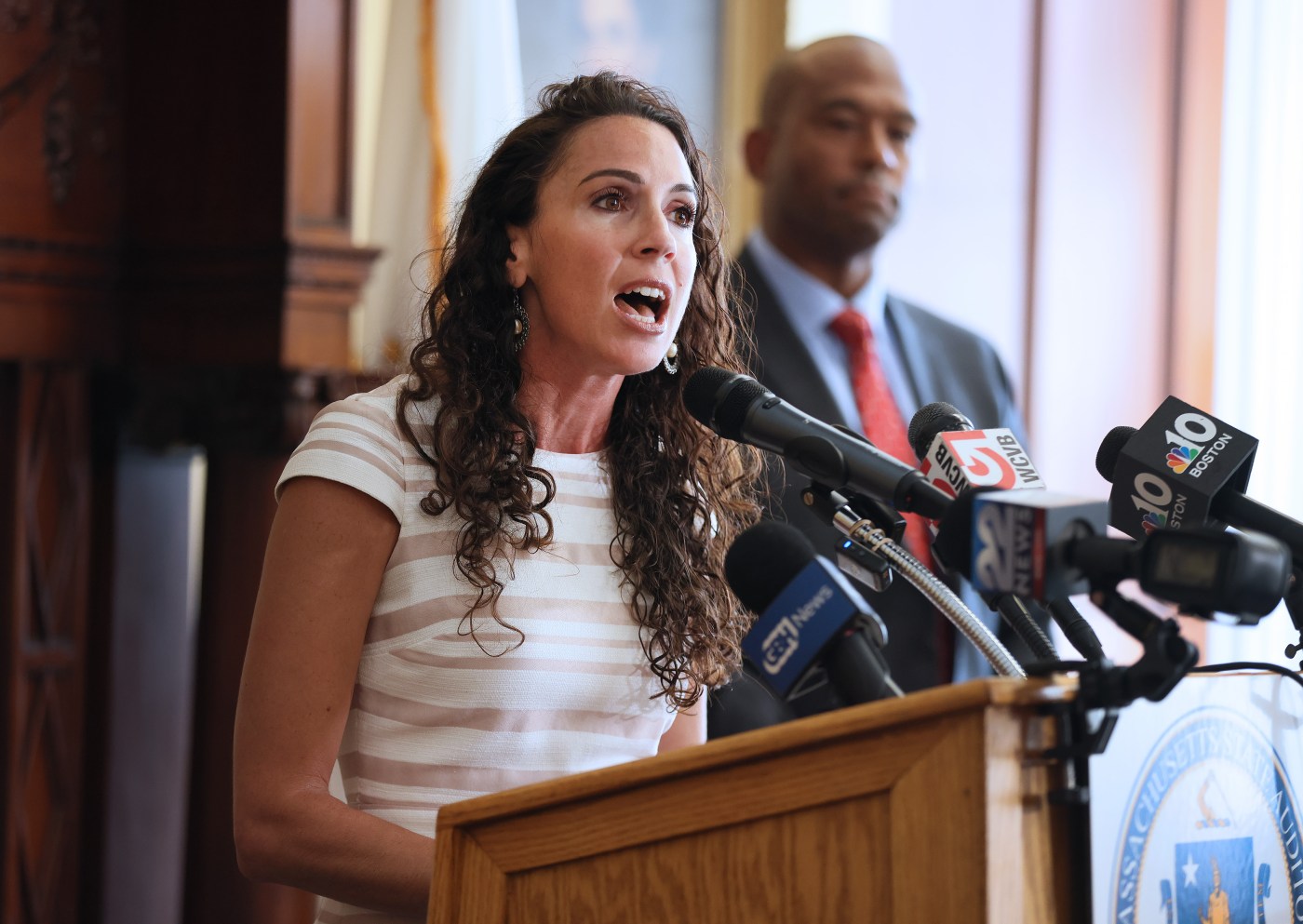
Auditor DiZoglio claims legislative audit law takes effect Thursday but Galvin says not so fast
State Auditor Diana DiZoglio argued Wednesday that a successful ballot question allowing her office to investigate the Legislature takes effect Thursday, a claim that was immediately rebuked by Massachusetts’ top election official.
DiZoglio zeroed in on a provision of the state constitution that says ballot questions “shall become law and shall take effect in 30 days” after a state election so long as they are approved with at least 30% of total votes cast. The legislative audit question was approved with nearly 2.3 million votes, or nearly 72% of ballots cast, according to state data.
“Our interpretation with our general counsel is that it is 30 days after the election,” DiZoglio told reporters from inside her State House office. “That’s what it says. We’re just reading it and that’s our office’s interpretation.”
But Secretary of State William Galvin said state elections are not over until their results are certified by Gov. Maura Healey and the Governor’s Council — an eight-person elected body that also approves judges, pardons, and commutations — and the law will take effect Jan. 3.
Galvin said it has long been his office’s interpretation that ballot questions take effect 30 days after results are certified as results may not always be set in stone a month after voters hit the polls. Election officials could still be counting votes after the election or conducting recounts, two scenarios that could delay certification.
The Secretary of State’s Office was still counting ballots 10 days after the Nov. 5 election because they were required to receive votes from overseas residents, Galvin told reporters Wednesday shortly after the Governor’s Council voted to certify local election results.
“(DiZoglio is) entitled to her opinion. If she wants to pursue it in a court, she can. I’m telling you what my opinion is. And if we all end up in court, we’ll tell the judges, and it’ll be their opinion that will count,” he said.
DiZoglio, a former state lawmaker from Methuen, asked Attorney General Andrea Campbell last month to greenlight a lawsuit against the Legislature in an attempt to force both the House and Senate to comply with a reignited audit attempt after legislative leaders did not comply with a previous probe.
Campbell’s office previously said they have no role in the matter until the law takes effect and there is a formal dispute between DiZoglio and the House and Senate.
In a letter to DiZoglio sent Nov. 27, Campbell said the new law is not yet in effect and pointed to the provision in the state constitution.
“As a result, the Office of the State Auditor does not yet have the authority to seek information from the Legislature under the new law,” the letter said.
A spokesperson for Campbell said the letter cited the relevant constitutional provision but took no position on whether the law takes effect 30 days after the election or 30 days after the election results are certified.
Lawyers for the House and Senate have refused to participate in the renewed audit attempt, which DiZoglio said will focus on the Legislature’s finances, state contracts and procurements, nondisclosure agreements, and other internal proceedings.
In a letter sent last month to DiZoglio, legislative attorneys said she still “lacks the legal authority” to crack open their books because the measure does not take effect until 30 days after the election results are certified.
Spokespeople for Mariano and Spilka declined to comment Thursday and referred the Herald back to the letter, which was a response to a Nov. 8 missive from DiZoglio informing the two branches that she intended to pursue a “performance audit” of the Legislature.
“Your request is untimely,” the lawyers for the House and Senate said in the letter.
At her State House office Thursday, DiZoglio said the timing of when ballot questions take effect is still unsettled and pointed to a document crafted by Galvin’s office that says “courts have not definitively decided” the matter.
“If the petitioners want to ensure that the initiative measure takes effect at the earliest possible date, it is suggested that the petitioners state in the measure itself that it is to become effective immediately upon becoming law,” the document said. “That will mean it becomes effective immediately upon certification of the election results.”
Act on Mass Executive Director Scotia Hille said the Legislature is “standing alone” in its interpretation that the law takes effect 30 days after results are certified.
“It raises the question of the reason why they’re seeking that delay,” Hille said.


